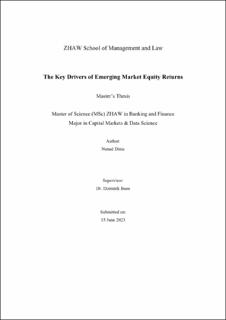Please use this identifier to cite or link to this item:
https://doi.org/10.21256/zhaw-29340| Publication type: | Master thesis |
| Title: | The key drivers of emerging market equity returns |
| Authors: | Dinic, Nenad |
| Advisors / Reviewers: | Boos, Dominik |
| DOI: | 10.21256/zhaw-29340 |
| Extent: | 64 |
| Issue Date: | 2023 |
| Publisher / Ed. Institution: | ZHAW Zürcher Hochschule für Angewandte Wissenschaften |
| Publisher / Ed. Institution: | Winterthur |
| Language: | English |
| Subject (DDC): | 332.6: Investment |
| Abstract: | This master’s thesis focuses on identifying the key determinants of emerging markets(EM) equity returns using country indices. The study incorporated a total of six fundamental, five macroeconomic, and five technical and sentiment indicators to detect potential predictors of EM equity index returns. In a first step, Mean group (MG) estimation and pooled ordinary least squares (POLS) regressions were conducted to identify significant variables over various sample periods. In a second step, a backtesting strategy covering the period from 2013 to 2022 with quarterly rebalancing was performed to assess the predictive power of the identified significant variables. Among the portfolio variants, those with long positions in countries ranked in the top quintile of fundamental indicators delivered the highest total returns. The POLS long portfolio, consisting of countries with top quintile scores in all six fundamental indicators (price-to-earnings ratio, price-to-book ratio, earnings per share, dividends per share, return on equity, and price-to-sales ratio) generated annualised returns of 10.48%, significantly outperforming the MSCI Emerging Markets Index, which returned 2.36% per year. When short positions for countries in the bottom quintile of the six fundamental variables were included to form a long-short portfolio, annualised returns fell to 8.1%. However, the inclusion of short positions considerably improved the Sharpe ratio from 0.496 in a long only portfolio, to 1.226 in the long-short variation. In contrast, portfolios with long positions in countries ranked in the top quintile of macroeconomic and technical indicators failed to capture the relationship for consistently higher returns or even underperformed the benchmark. The results suggest that fundamental indicators are superior predictors of three-month forward returns for EM equities compared to macroeconomic and technical indicators, which is consistent with the existing literature. Practitioners in the field of EM equity investment can derive practical implications from this study. Emphasising on fundamental indicators in the investment decision-making process is crucial, as they have shown greater explanatory power for future returns. A straightforward approach could involve employing a scorecard methodology to rank EM countries based on the six significant fundamental factors: price-to-earnings ratio (PE), price-to-book ratio (PB), return on equity (ROE), earnings per share (EPS), dividends per share (DPS), and price-to-sales ratio (PS). By assigning appropriate weights and directions to these factors, practitioners can identify countries with strong fundamental characteristics that generate higher risk-adjusted investment returns. While macroeconomic and technical analysis should not be disregarded entirely, their relative importance in the investment decision-making process should be weighted lower. In conclusion, this study underscores the significance of fundamental indicators in driving EM equity returns and offers practical guidance for practitioners. By adopting a country selection approach that prioritises fundamental factors, practitioners can potentially enhance their investment strategies and achieve superior performance in EM equity markets. |
| URI: | https://digitalcollection.zhaw.ch/handle/11475/29340 |
| License (according to publishing contract): | CC BY-NC-ND 4.0: Attribution - Non commercial - No derivatives 4.0 International |
| Departement: | School of Management and Law |
| Appears in collections: | MSc Banking and Finance |
Files in This Item:
| File | Description | Size | Format | |
|---|---|---|---|---|
| 2023_Nenad_Dinic_MSc_BF.pdf | 1.53 MB | Adobe PDF |  View/Open |
Show full item record
Dinic, N. (2023). The key drivers of emerging market equity returns [Master’s thesis, ZHAW Zürcher Hochschule für Angewandte Wissenschaften]. https://doi.org/10.21256/zhaw-29340
Dinic, N. (2023) The key drivers of emerging market equity returns. Master’s thesis. ZHAW Zürcher Hochschule für Angewandte Wissenschaften. Available at: https://doi.org/10.21256/zhaw-29340.
N. Dinic, “The key drivers of emerging market equity returns,” Master’s thesis, ZHAW Zürcher Hochschule für Angewandte Wissenschaften, Winterthur, 2023. doi: 10.21256/zhaw-29340.
DINIC, Nenad, 2023. The key drivers of emerging market equity returns. Master’s thesis. Winterthur: ZHAW Zürcher Hochschule für Angewandte Wissenschaften
Dinic, Nenad. 2023. “The Key Drivers of Emerging Market Equity Returns.” Master’s thesis, Winterthur: ZHAW Zürcher Hochschule für Angewandte Wissenschaften. https://doi.org/10.21256/zhaw-29340.
Dinic, Nenad. The Key Drivers of Emerging Market Equity Returns. ZHAW Zürcher Hochschule für Angewandte Wissenschaften, 2023, https://doi.org/10.21256/zhaw-29340.
Items in DSpace are protected by copyright, with all rights reserved, unless otherwise indicated.